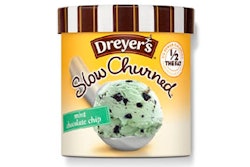AUSTIN, Texas (PRNewswire) — More Americans than ever are choosing natural and/or organic foods according to the fifth annual Whole Foods Market® Food Shopping Trend Tracker Survey. The research revealed that nearly three out of four Americans (73 percent) don't want to compromise on the quality of the food they buy regardless of current food prices and nearly two-thirds (64 percent) describe themselves as "value seekers" when it comes to grocery shopping.
The survey, conducted online within the U.S. by Harris Interactive on behalf of Whole Foods Market from August 3-7, 2012 among 2,274 adults age 18 and older, found nearly three out of four Americans (71 percent) prefer to buy natural and/or organic foods over conventional foods if prices are comparable. One in four Americans (27 percent) are devoting more than a quarter of their grocery dollars to natural and/or organic products, up 35 percent from four years ago.
"We see that Americans from all demographics are seeking more natural and organic foods; especially if the price is right," said A.C. Gallo, president and COO of Whole Foods Market. "We don't believe shoppers should have to sacrifice quality for price, so we aim to offer high quality food that fits every budget through competitive pricing and expanding our 365 Everyday Value line."
Further, the research disclosed that many Americans are willing to pay more for foods that meet certain criteria:
- Nearly half (47 percent) are willing to pay higher prices for locally produced foods
- Nearly a third (32 percent) are willing to pay more for foods with no artificial ingredients, preservatives or colorings
- Nearly one out of three (30 percent) are willing to pay more for meats raised with no antibiotics or added growth hormones and one in four (24 percent) are willing to pay more for meats raised under humane animal husbandry standards
Aside from price, a majority of Americans say the overall quality (88 percent) and selection (85 percent) of products, regular sales and promotions (76 percent) and trust in the grocery retailers (76 percent) are very or fairly important when grocery shopping.
To help shoppers save, Whole Foods Market continues to expand its 365 Everyday Value® line, as well as their bulk offerings, "value pack" options in meat, seafood, produce and case discounts on food and wine. Shoppers on a budget can look for coupons, affordable recipes and cost-saving tips in The Whole Deal, the company's national promotions program, which offers, on average, $45 of savings per issue.
While the majority consider themselves "value seekers," here's a breakdown of how Americans describe their grocery shopping style, key findings show that*:
- Value Seekers (64 percent) – someone very aware of prices, bargains, coupons and specials
- One-Stop (41 percent) – shoppers who want all their needs met by one store, from staple pantry items and meats to family-friendly offerings and body care
- Health-Minded (32 percent) – someone who seeks out healthy foods and educational resources
- Conscious Shoppers (17 percent) – someone who seeks out organic, sustainable, Fair Trade, local foods and growers
- On-the-Go (14 percent) – someone who shops at the closest store and seeks out convenience and prepared foods
- Adventurous Eater (13 percent) – the foodie looking for specialty products
Survey Methodology
The Food Shopping Trends Tracker survey was conducted online by Harris Interactive on behalf of Whole Foods Market, Inc. between August 3-7, 2012 among 2,274 adults ages 18+; in 2008 this was conducted between August 6-8 among 2,209 adults ages 18+. This online survey is not based on a probability sample and therefore no estimate of theoretical sampling error can be calculated.






















